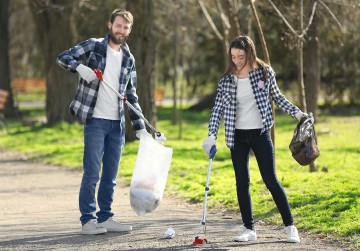 Volunteering offers people an opportunity to fill a unique, self-defined role in society built around personal generosity and a sense of community. Several researchers have found that volunteering and other acts of altruism can benefit a person’s mental and physical well-being.
Volunteering offers people an opportunity to fill a unique, self-defined role in society built around personal generosity and a sense of community. Several researchers have found that volunteering and other acts of altruism can benefit a person’s mental and physical well-being.
What Is Volunteering?
Acts considered volunteering can range from washing out kennels at an animal shelter to serving on a nonprofit board to working on a political campaign. Given the diversity of associated tasks, coming up with a singular definition is difficult, but researchers and Professors John Wilson (of Duke’s Department of Sociology) and Marc Musick (Associate Dean for Student Affairs, College of Liberal Arts and Professor, Department of Sociology, University of Texas at Austin) have risen to the challenge. They have completed a series of studies and papers on the effects of and inspirations behind volunteering, and they describe it as the voluntary “face-to-face amelioration of the personal problems of individuals.”
How Does Volunteering Help the Volunteer?
"Research has shown that there's evidence volunteer work promotes psychological well-being … In my own work I've shown it's linked to improvements in factors like depressive symptoms, purpose in life and feelings of optimism,” says Public Health Research Associate Rodlescia Sneed of Michigan State University, who has studied how volunteering can change and aid participants.
In 2013, Sneed published a study called “A prospective study of volunteerism and hypertension (elevated blood pressure) risk in older adults,” in the journal, Psychology and Aging. Her report shared the findings of a four-year evaluation between 2006 and 2010 of how volunteering affected hypertension risk as well as other health factors for older adults (over 50).
The amount of time participants spent volunteering and their blood pressure were monitored and Sneed found that people who volunteered at least 200 hours annually had a reduced risk of hypertension. Because hypertension can lead to serious health risks such as heart attack and stroke, this is an important finding. Volunteering at this rate was also found to be associated with improved psychological well-being and an increase in physical activity. Older adults may lack consistent physical activity and social interaction, which Sneed says volunteering can provide. She also expresses that it can help people struggling with excessive worry or anxiety to take their minds off their own problems for a while and see life from a new role and perspective.
In 2004, the charity Community Service Volunteers (CSV) in the United Kingdom polled more than 600 volunteers and found about 50 percent of people who had been volunteering for more than two years experienced reduced depression. Participants reported reduced stress as well; 63 percent of those aged 25 to 34 and 62% of those over 65.
How Does Helping Others Make Us Feel?
How does being kind to others – the essence of volunteering -- affect us? In 2006, researchers from the National Institute of Neurological Disorders and Stroke in Maryland found that when people donated money to a charity, their brain's reward and pleasure center was activated. This center – the mesolimbic pathway – releases the neurotransmitter dopamine when people experience sex and wealth, eat, or take certain drugs. So, helping others makes us feel good and may be something we are “wired for.”
A 2013 study called, “Helping hands, healthy body?” found that some people who volunteer experience a spike in oxytocin, a hormone and neurotransmitter involved with social interaction. Oxytocin is sometimes called the "love hormone," because it increases during childbirth, breast-feeding, physical affection such as hugging, and orgasm.
In 2016, a study found that participants whose impulse control was reduced displayed increased generosity. A magnetic coil was used to send electrical currents to specific regions in the prefrontal cortex, “temporarily removing their ability to block impulses.” People whose impulse control was “disabled” were about 50 percent more generous than those in a control group.
How Does Volunteering Help Society?
Volunteering is clearly intended to serve the recipients, but can altruistic behavior help society as a whole? American political Scientist Robert Putnam thinks so – he links volunteering with what he calls social capital: “features of social organization, such as trust, norms, and networks, that can improve the efficiency of society by facilitating coordinated actions.” In other words, he thinks communities in which people volunteer develop a higher level of trust that can aid the community in its overall ability to function and collaborate. Wilson and Musick point out that volunteers can also gain new occupational skills, which can benefit their community.
They also write that for many people, the benefits of volunteering are intrinsic; “Volunteering is how they express their identity, or their values … Self-discovery is not the effect of volunteering; it is volunteering itself.”
...
Sources:
Wilson, John, and Marc Musick. “The Effects of Volunteering on the Volunteer.” Law and Contemporary Problems, vol. 62, no. 4, 1999, p. 141., doi:10.2307/1192270.
Rogers, Kaleigh. “Volunteering Is the Best Kept Secret for Mental Health.” Motherboard, 5 Dec. 2017, motherboard.vice.com/en_us/article/a37nvk/volunteering-is-the-best-kept-secret-for-mental-health-stressweek2017.
“Helping Hands, Healthy Body? Oxytocin Receptor Gene and Prosocial Behavior Interact to Buffer the Association between Stress and Physical Health.” Hormones and Behavior, Academic Press, 24 Jan. 2013, www.sciencedirect.com/science/article/pii/S0018506X13000202.
“The Joy of Giving.” The Economist, The Economist Newspaper, 14 Oct. 2006, www.economist.com/node/8023307.
“Increasing Generosity by Disrupting Prefrontal Cortex.” Taylor & Francis, www.tandfonline.com/doi/full/10.1080/17470919.2016.1154105.
Julia Travers is a writer with a focus on science, culture and creative responses to adversity. Her work can be found with NPR, Discover Magazine, APR and Earth Island Journal, among other publications. She is also a teacher and an artist. Website: https://jtravers.journoportfolio.com/ Contact info: traversjul at gmail (dot) com